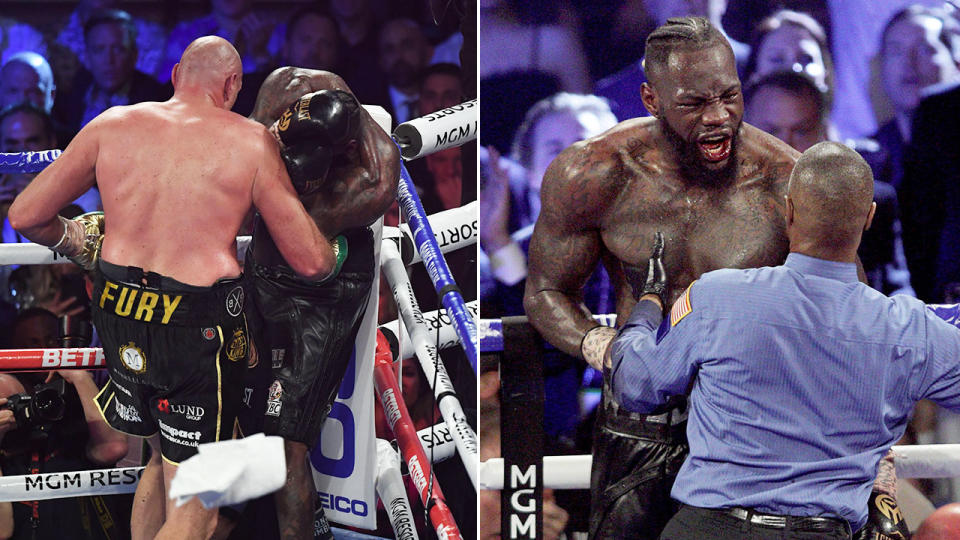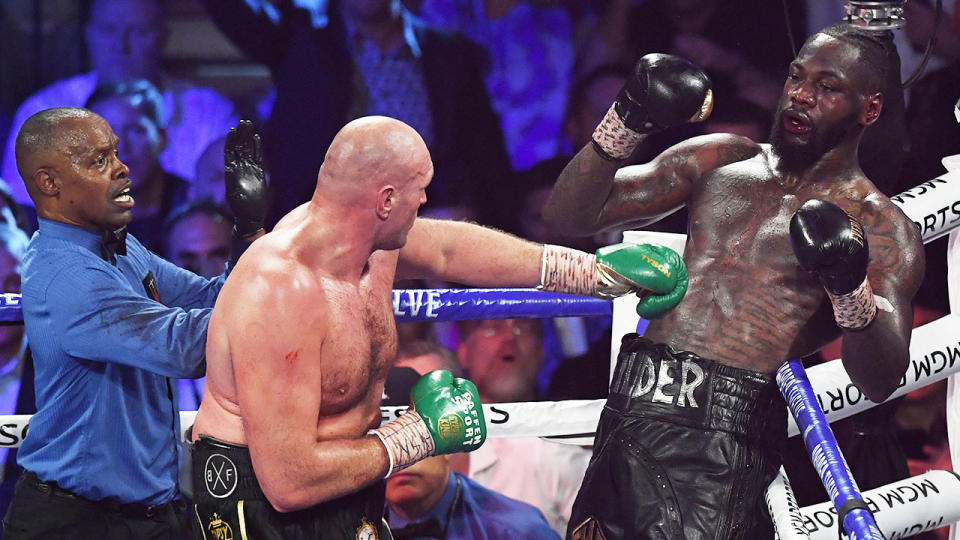Truth emerges about Deontay Wilder towel controversy
The most stunning occurrence at the MGM Grand Garden Arena on Saturday was not that Tyson Fury completely overwhelmed Deontay Wilder before stopping him in the seventh round of their heavyweight title bout.
Instead, the stunner of the night came when Wilder coach Jay Deas without remorse threw his assistant, Mark Breland, under the bus for throwing in the towel.
‘DISGUSTING’: Boxing world erupts over Tyson Fury's 'sick' act
‘CAN’T FIGHT’: Pundit's brutal takedown of Deontay Wilder
“Mark threw in the towel,” Deas said of Breland. “I didn’t think he should have. Deontay’s the kind of guy who is a go-out-on-his-shield kind of guy. He will tell you straight up, ‘Don’t throw the towel in.’ In fact, in the dressing room, when Tyson was getting his hands wrapped, in one of the earlier fights on the screen which they showed in the locker room, they had a guy who got stopped. And we were like, ‘Stop the fight. Stop the fight.’ And right when the ref stopped the fight, the towel came in. And Tyson looked at his people and said, ‘Never,’ like that.

“And I said, ‘Yeah, that’s the same kinda guy that Deontay is.’ He does not want that. And then you’ve always got to consider also that Deontay is a fearsome puncher. So that’s always a difficult thing because he always has that shot to land a big shot and turn things around. So, that’s what happened there. But Deontay is doing well and he’ll be back. He’ll be all the better for it.”
He’ll be back because Breland looked after him and did what a trainer is supposed to do for his fighter: Protect him. Wilder often says, “We risk our lives for others’ entertainment,” which is entirely true and also why they need trainers to make those difficult choices. The fighter almost always wants to continue and wants the opportunity to at least go down swinging.”
Following the knockdown in the fifth round courtesy of a perfect left to the body, Wilder no longer had a chance to win the fight. His legs weren’t steady underneath him, and the doctor who treated him after the bout said Wilder’s primary complaint was about his legs.
He was stumbling around the ring and out of balance for most of the last six rounds. Fury hit him in the second with a number of good right hands and Wilder seemed unable to properly balance. He fell several times that weren’t ruled knockdowns, but came as a result of punches earlier that robbed him of his legs.
Tyson Fury embarrassed Deontay Wilder by handing him a brutal beating for the duration of the fight.
Please don't waste our time with a third fight, Wilder's already dead.#Fury #Championpic.twitter.com/MFCRL8Kakc— El Tel (@ElTelBoxing) February 23, 2020
The fight was over by the fifth round at the latest, and all that going on for another round-and-a-half did was subject Wilder to more unnecessary punishment. Wilder did not attend the post-fight news conference, though a doctor who treated him told Yahoo Sports that he did not suffer either a ruptured eardrum or a broken jaw, as had been speculated. He had a two-centimetre concha cut in his ear that needed seven stitches to repair.
Knowing when to stop a fight and when to let it continue is one of the most difficult decisions to be made in boxing, both for the referees and for the trainers who are licensed to work in their corners. It’s especially delicate when a fighter with power like Wilder is the one being beaten badly. The trainer has seen so many instances of the boxer landing that one big shot that got him out of trouble and ended a bout, that he keeps thinking it’s going to come.
But Wilder was taking a beating from a 273-pound man who on Saturday night was the best he’s ever been. He had a great strategy and executed it perfectly.
The two had fought to a split draw in 2018, so it began as a 50-50 fight. But with each punch that Fury landed from the second round on, the odds began to swing heavily in Fury’s favor. By the fourth round, it was 75-25 in favor of Fury and in the fifth, when the second knockdown of the fight came, it was no worse than 90-10.
Trainer protected Wilder from further punishment
Stopping the fight at that point might have cost Wilder a 10-percent shot to land the home run punch and keep his title, but what it really did was to allow him to leave the arena under his own power and live to fight another day. And to talk to his children and his friends and other family members and to enjoy the fruits of his most successful career.

Fighters are often not happy when their trainer stops a fight they’re in. And, predictably, Wilder said in the ring he didn’t like the stoppage and wanted the chance to continue.
“Things like this happen,” Wilder said in the ring. “The best man won tonight, but my corner threw in the towel and I was ready to go out on my shield. I had a lot of things going on heading into this fight. It is what it is, but I make no excuses tonight. I just wish my corner would have let me go out on my shield. I’m a warrior. He had a great performance and we will be back stronger.”
The fact that Breland threw in the towel in no way lessens the toughness Wilder possesses or makes him any less of a warrior. He doesn’t need to suffer permanent brain damage for the sake of a sport notorious for cannibalizing so many of its own and then casting them adrift when they’re no longer of value.
Fury fought a near-perfect fight, and he should be commended for that.
Breland should be commended for having the compassion and, let’s be frank, the common sense, to step in and save his man when no one else was willing to do it.
Breland made the right choice. He made the only choice. For a professional trainer to suggest otherwise is tantamount to professional malpractice.
Kevin Iole - Yahoo Sport Combat Journalist

